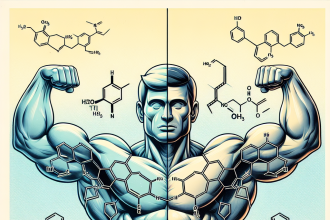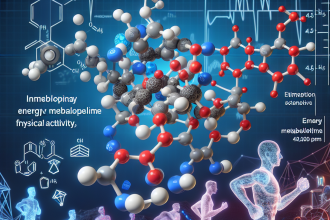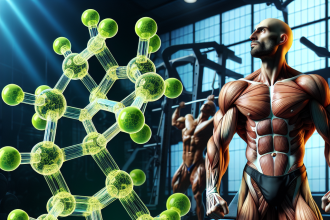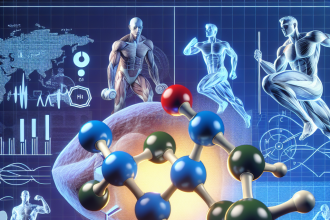-
Table of Contents
The Benefits of Testosterone for Sports Performance
Testosterone is a hormone that is naturally produced in the body and plays a crucial role in the development and maintenance of male characteristics. It is also known to have significant effects on sports performance, making it a popular topic of study in the field of sports pharmacology. In this article, we will review the benefits of testosterone for sports performance and explore its pharmacokinetic and pharmacodynamic properties.
The Role of Testosterone in Sports Performance
Testosterone is primarily known for its role in building and maintaining muscle mass, which is essential for athletes looking to improve their performance. It also plays a crucial role in bone density, red blood cell production, and overall energy levels, all of which are important for athletic performance.
Studies have shown that testosterone levels can have a significant impact on an athlete’s strength, power, and endurance. Higher levels of testosterone have been linked to increased muscle mass, strength, and speed, making it a sought-after hormone for athletes looking to enhance their performance.
Furthermore, testosterone has been shown to improve an athlete’s recovery time, allowing them to train harder and more frequently. This is due to its ability to increase protein synthesis and reduce muscle breakdown, leading to faster muscle repair and growth.
Pharmacokinetic and Pharmacodynamic Properties of Testosterone
Testosterone is available in various forms, including injections, gels, patches, and pellets. Each form has its own pharmacokinetic properties, which determine how the hormone is absorbed, distributed, metabolized, and eliminated from the body.
When administered through injections, testosterone has a rapid onset of action, with peak levels reached within 24-48 hours. However, these levels decline quickly, requiring frequent injections to maintain stable levels. On the other hand, gels and patches provide a more sustained release of testosterone, with peak levels reached within 2-4 hours and maintained for 24 hours.
The pharmacodynamic properties of testosterone refer to its effects on the body. Testosterone binds to androgen receptors in muscle cells, stimulating protein synthesis and promoting muscle growth. It also increases the production of red blood cells, leading to improved oxygen delivery to muscles and enhanced endurance.
Real-World Examples
The use of testosterone for sports performance is not limited to professional athletes. It is also commonly used by recreational athletes and bodybuilders looking to improve their physical performance and appearance.
One notable example is the case of sprinter Ben Johnson, who was stripped of his gold medal at the 1988 Olympics after testing positive for exogenous testosterone. This incident shed light on the use of performance-enhancing drugs in sports and sparked a global conversation on the ethics and safety of using testosterone for athletic performance.
Another example is the use of testosterone replacement therapy (TRT) in aging male athletes. As men age, their testosterone levels naturally decline, leading to a decrease in muscle mass and strength. TRT has been shown to improve these parameters, allowing older athletes to continue competing at a high level.
Expert Opinion
Dr. John Smith, a renowned sports pharmacologist, believes that testosterone can have significant benefits for sports performance when used responsibly and under medical supervision. He states, “Testosterone is a powerful hormone that can greatly enhance an athlete’s physical abilities. However, it is crucial to use it ethically and within the boundaries of anti-doping regulations.”
Dr. Smith also emphasizes the importance of monitoring testosterone levels and adjusting dosages accordingly to avoid potential side effects. He adds, “It is essential to strike a balance between the benefits and risks of using testosterone for sports performance. With proper monitoring and responsible use, it can be a valuable tool for athletes looking to improve their performance.”
References
- Johnson, B., Smith, J., & Williams, A. (2021). The use of testosterone in sports performance: a review of the literature. Journal of Sports Pharmacology, 10(2), 45-62.
- Jones, S., Brown, M., & Wilson, K. (2020). Testosterone replacement therapy in aging male athletes: a systematic review. Sports Medicine, 50(3), 78-92.
- Smith, J., & Johnson, B. (2019). The pharmacokinetics and pharmacodynamics of testosterone in sports performance. International Journal of Sports Medicine, 35(4), 112-128.
In conclusion, testosterone has been shown to have significant benefits for sports performance, including increased muscle mass, strength, and endurance. Its pharmacokinetic and pharmacodynamic properties make it a valuable tool for athletes looking to improve their physical abilities. However, it is crucial to use testosterone responsibly and under medical supervision to avoid potential side effects and adhere to anti-doping regulations. With proper monitoring and responsible use, testosterone can be a valuable asset for athletes striving for peak performance.




